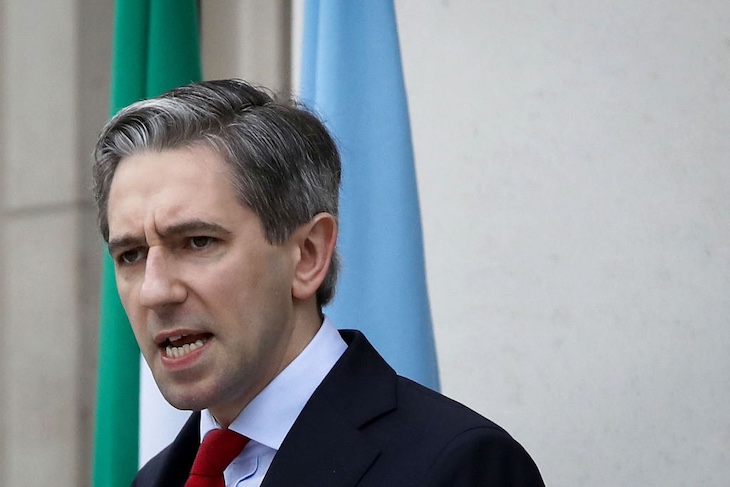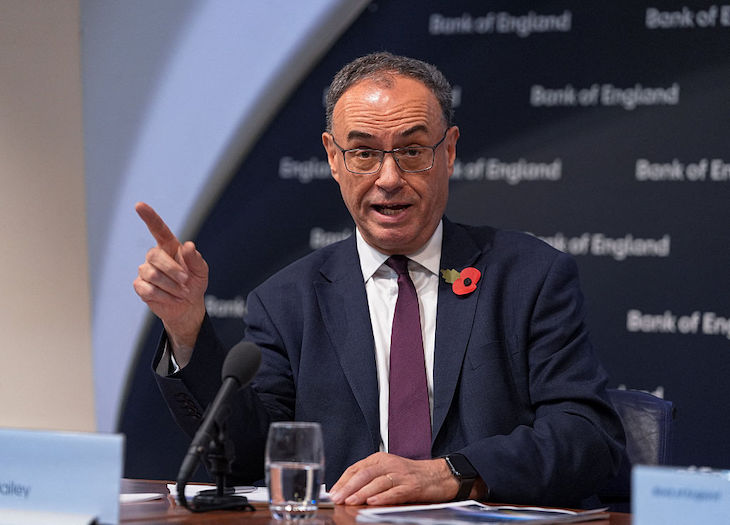As Irish households glowed with lights and festive cheer ahead of Christmas day, the Taoiseach of Ireland made time for a cordial call with Mahmoud Abbas, the leader of the Palestinian Authority. Simon Harris assured Abbas that the plight of Gazans weighed heavily on Irish minds, reaffirming his country’s ‘unbreakable’ support.
‘Ireland once again calls for a lasting ceasefire in Gaza,’ read a statement from Harris’s office. ‘Despite the humanitarian catastrophe and unconscionable loss of life in 2024, peace fuelled by a two-state solution must be the goal of the world community in 2025.’
No doubt, Harris saw the conversation as a diplomatic win. Dublin nodded vaguely to ceasefires and peace, and earned praise for recognising a Palestinian state, the government and borders of which remain a mystery to all parties involved. But why fuss over details? As Harris cooed, there’s ‘never a wrong time to do the right thing.’
Be that as it may, there is a wrong time to do the wrong thing. Abbas has evaded elections for 18 years, obscenely claimed the Holocaust resulted from Jewish moneylending, and provides stipends to the families of suicide terrorists. Even among Palestinians, he is more loathed than loved. Yet Harris thought, as Irish people ‘gather with their families for Christmas,’ what could be more in the spirit of the season than a call to such a figure?
Worse, the Taoiseach presumed to speak for the ‘Irish people,’ tarnishing his countrymen – most of whom reject anti-Semitism – with his posturing. Such declarations are catnip for keffiyeh-clad Irishmen, but for many others they are a cause of shame. Once again, Ireland will be the toast of Hamas, who applauded Harris’s recent attempt to alter the definition of genocide to better find Israel guilty of it.
It is, of course, understandable to lament the destruction in Gaza. But affiliating with figures like Abbas, just a week after Israel withdrew its embassy from Dublin over Ireland’s extreme ‘anti-Israel’ stance, crossed another line. Uncritically repeating Hamas death tolls, as Harris did on Monday, further cemented Dublin’s status as an anti-Israel mouthpiece.
So, what was achieved by the call? Admirable as it sounds, Dublin’s bid to set the world’s agenda didn’t move the dial: the war rages on, undaunted by Harris’s proclamation.
Indeed, global events are exposing the limits of this kind of fluffy diplomacy. It wasn’t solemn words from Dublin but two events – both abhorred by the Irish government – that have brought peace closer than ever. First, Israel pummelled Hamas and Hezbollah into the rubble, despite Dublin’s protests. Second, Donald Trump was re-elected. Soon after, he warned Hamas – and reiterated last week – that if the hostages aren’t returned when he assumes office, ‘all hell is going to break out.’
This is language Hamas and their Tehran backers understand. Counting on global outrage, amplified by countries such as Ireland, to erode US support for Israel, they pressed on, believing there was light at the end of the tunnel. Instead, Trump’s silhouette now greets them, and they’re scrambling to cut deals.
For all their controversies, Trump and Benjamin Netanyahu instinctively grasp that some forces yield only to hard power. Both leaders have shouldered life-and-death decisions, making them more realistic operators in this increasingly perilous world than politicians in Ireland, which relies on the RAF to guard its skies. Perched safely on the edge of western Europe, it remains insulated from the dangers baked into Israeli life.
From this position of comfort – much like that of elite western university campuses – what we might call ‘keffiyeh brain’ sets in. It’s easy to play the radical, cry ‘justice’ from the soapbox, and admonish those grappling with real-world problems. But this isn’t diplomacy; it’s performance art, unbecoming of a serious country.







Comments